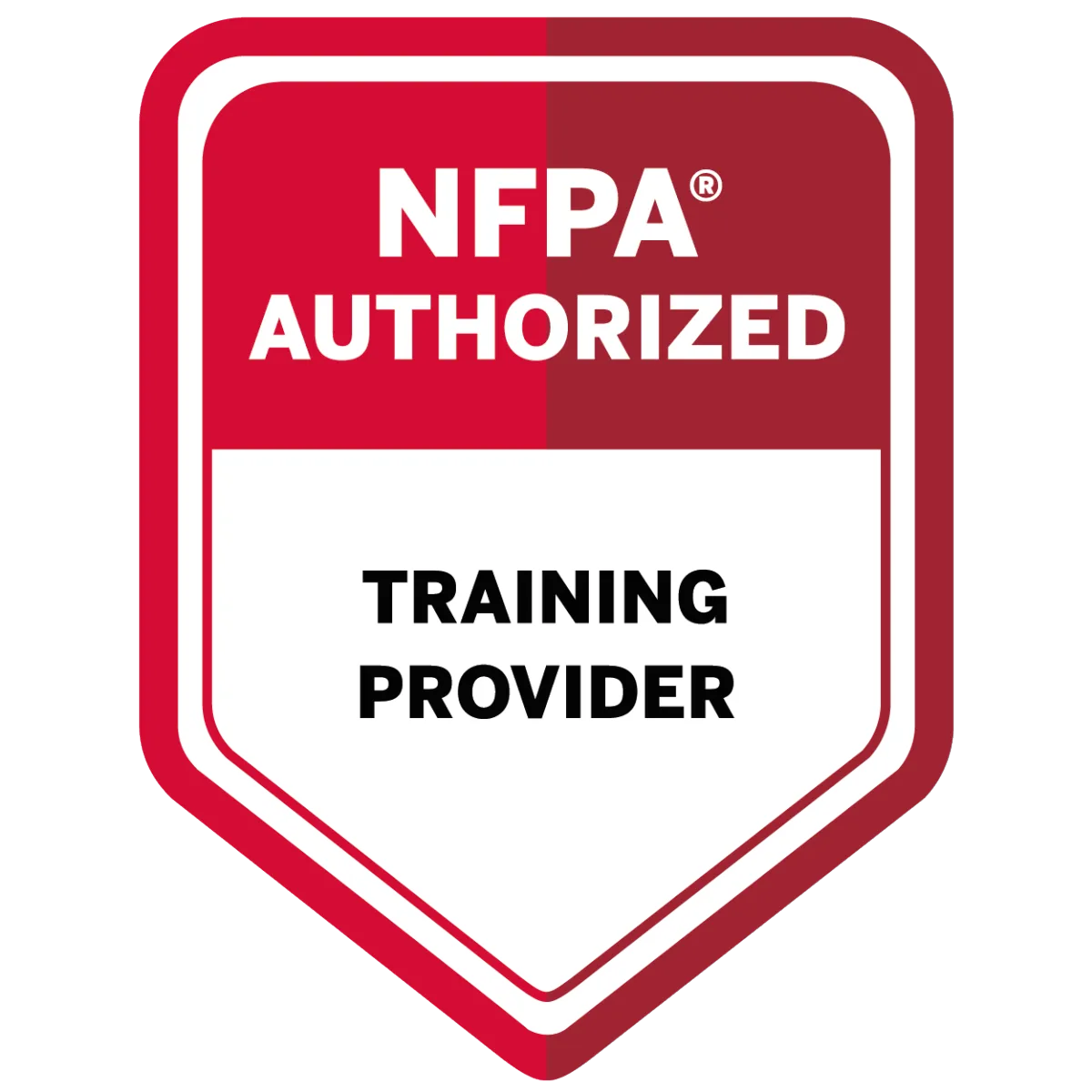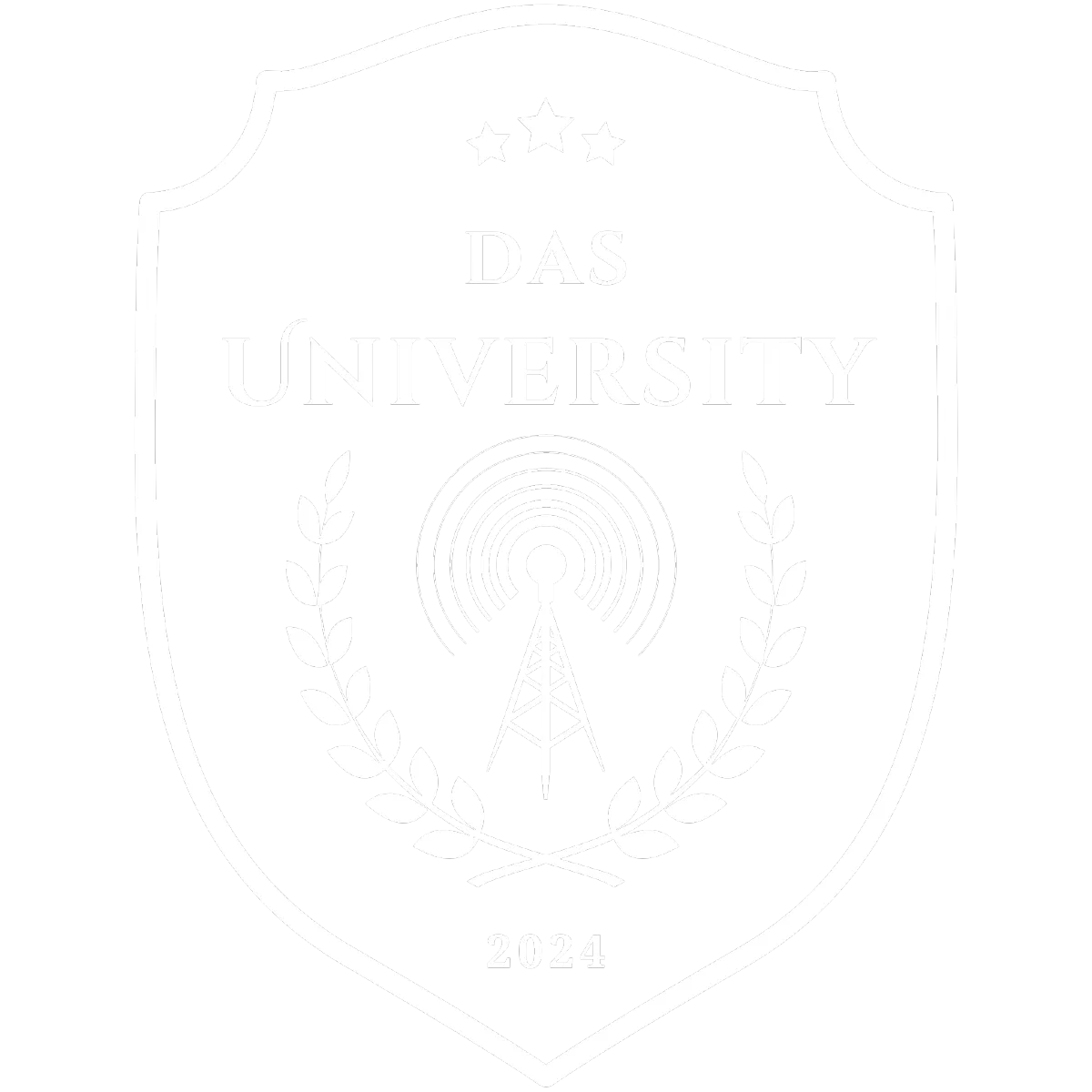WERE GOING ON TOUR!
JOIN THE DAS UNIVERSITY LIVE SUMMIT
2026 TRAINING CAMP TOUR
11 CAMPS NATION WIDE
Presented by GAMMA, BEST Ent. Mobili-fi and Industry Experts
Explore Our Unique Educational Platform
Join thousands of safety professionals, fire marshals, inspectors, integrators, and builders who are mastering the skills to install, certify, and inspect mission-critical in-building radio systems. With on-demand training, you can learn at your pace, apply it in the field, and start making buildings safer immediately.
Upgrade to our premium platform and gain the ability to earn DAS University training certificates and ICC continuing education credits for every hour of training completed. Whether you’re advancing your career, meeting code compliance requirements, or training your team, DAS University provides the recognition and real-world knowledge you need to lead with confidence.

Virtual Learning Environment
Step into our cutting-edge
virtual learning spaces, equipped with the latest tools and resources tailored for
DAS ERCES training. Experience live webinars, interactive certificate courses, and real-time collaboration with peers and instructors, ensuring an engaging and hands-on educational journey.

Professional Development
We train you on what matters: real installation standards, testing protocols, and life-saving communication system design. Our expert-led courses help you
earn DAS University training certificates, connect to job placement pipelines, and gain the confidence to lead projects with AHJs, architects, and public safety officials.

Global and Inclusive Community
Join a powerful network of safety-first professionals from across the country and around the world. With 24/7 access to our online campus, and a shared mission to protect lives, you’re never learning alone. DAS University is your community for growth, connection, and career elevation.
AUTHORIZED TRAINING PARTNERS OF THE BELOW ORGANIZATIONS

Earn CEU credits for every course on our Premium platform


About DAS University
Pioneering the Future of Education
At DAS University, we are redefining the educational landscape by integrating state-of-the-art technology with personalized learning experiences. Our mission is to empower students globally with the skills and knowledge necessary to excel in the fast-growing fields of
Distributed Antenna Systems (DAS) and Emergency Responder Communication Enhancement Systems (ERCES).
Through a blend of expert-led training courses, real-world applications
, and a supportive community, we provide an unparalleled learning journey for professionals and beginners alike.
Whether you're pursuing ERCES training, exploring advanced DAS education, or preparing for real-world challenges, we ensure you’re equipped for success. Join DAS University and transform your potential into leadership in the industry.
Achieve Training Certificates at DAS University
Elevate your professional profile with our highly regarded
DAS and ERCES training courses. Designed to provide both foundational and advanced expertise, these programs prepare you for real-world challenges in the
DAS and in-building communications industry.
Gain cutting-edge knowledge, practical skills, and DAS University training credentials to advance your career in public safety communications, emergency responder technologies, and beyond.
Hands-on project submissions
Industry-recognized guest speakers
Collaboration with 30+ industry partners
Real-time system testing simulations
Access to exclusive ERCES webinars
Unlock Your Career Potential with DAS University Training Certificates
Our DAS and ERCES training certificates document your completion—they open doors to new professional opportunities in the growing field of in-building communication systems.
Our training program participants develop practical skills for the industry, DAS University powered by Gamma is your gateway to professional growth and success. Whether you’re aiming for job placements, advanced career counseling, or building connections within a robust network of industry leaders, our programs are designed for your advancement.
Sign up now for FREE and start your journey toward professional excellence with DAS University!

Critical Connections: The Role of DAS in Enhancing Public Safety
In today’s fast-paced world, ensuring robust communication channels is more important than ever, especially for public safety personnel. Distributed Antenna Systems (DAS) play a pivotal role in enhancing these communication capabilities, ensuring that first responders and emergency personnel can effectively do their jobs when it matters most. At DAS University, we are dedicated to educating professionals on the critical importance of DAS technology, how it enhances public safety, the challenges it addresses, and its future potential.
Understanding DAS and Its Importance
A Distributed Antenna System (DAS) is a network of spatially separated antenna nodes connected to a common source. It provides wireless service within a structure or area where coverage is inadequate. DAS ensures that communication signals penetrate through thick walls and reach every corner of a building, which is crucial for public safety personnel operating in large or complex environments.
Key Benefits of DAS for Public Safety
Reliable Communication in Emergencies
Seamless Connectivity: DAS ensures that emergency responders have reliable communication in all areas of a building, from basements to stairwells, which are often dead zones in traditional wireless networks.
Immediate Response: Effective communication allows for immediate coordination among first responders, potentially saving lives and reducing property damage during emergencies.
Compliance with Safety Regulations
Building Codes: Many regions have stringent building codes that require adequate in-building wireless coverage for public safety communications. DAS helps buildings comply with these regulations, avoiding penalties and ensuring safety.
Fire Code Compliance: DAS systems are often required to meet specific fire code standards, ensuring they function correctly during a fire emergency and aiding firefighters in their response efforts.
Enhanced Coordination and Efficiency
Interagency Communication: DAS facilitates better communication between different emergency services (police, fire, medical), leading to more coordinated and effective responses.
Operational Efficiency: Ensuring all personnel can communicate without interruption enhances the overall efficiency of emergency operations, from routine checks to large-scale crisis management.
Overcoming Challenges with DAS
Building Materials and Design
Signal Obstruction: Modern buildings often use materials and designs that can obstruct wireless signals. DAS mitigates this by strategically placing antennas to ensure comprehensive coverage.
Retrofit Solutions: For older buildings, retrofitting with DAS can overcome the limitations of original construction, bringing them up to modern safety standards.
Scalability and Flexibility
Modular Design: DAS can be scaled to fit buildings of any size, from small office spaces to large multi-story complexes. This flexibility ensures that public safety communication needs are met regardless of the environment.
Future-Proofing: With the rapid evolution of wireless technology, DAS can be updated and expanded to incorporate new frequencies and standards, ensuring long-term viability.
Cost and Maintenance
Investment Justification: While the initial investment in DAS can be significant, the benefits in terms of safety, compliance, and operational efficiency justify the cost. Additionally, many jurisdictions offer incentives for buildings that implement DAS.
Ongoing Support: Regular maintenance and testing are crucial for ensuring DAS systems remain operational and effective, particularly in critical moments.
The Future of DAS in Public Safety
The future of DAS is closely tied to advancements in wireless technology and public safety requirements. Here are some trends and developments to watch:
Integration with 5G
Enhanced Capabilities: As 5G technology becomes more widespread, DAS will integrate with these new networks, offering even faster and more reliable communication capabilities for public safety.
IoT and Smart Buildings
Connected Systems: The Internet of Things (IoT) and smart building technologies will increasingly rely on robust DAS infrastructure to connect various devices and systems, enhancing overall building safety and efficiency.
Advanced Monitoring and Management
Real-Time Data: Future DAS systems will incorporate advanced monitoring tools that provide real-time data on system performance, allowing for proactive maintenance and immediate issue resolution.
Improved Public Safety Networks
Next-Generation Networks: Continuous improvements in public safety communication standards will drive the evolution of DAS, ensuring that these systems remain at the forefront of emergency response technology.
Conclusion
Distributed Antenna Systems (DAS) are crucial for enhancing public safety communications within buildings. By providing reliable, uninterrupted wireless coverage, DAS ensures that emergency responders can communicate effectively, comply with safety regulations, and operate efficiently. As technology advances, the role of DAS in public safety will only become more integral, making it an essential component of modern building infrastructure. At DAS University, we are committed to educating and preparing the next generation of professionals to harness the full potential of DAS technology, ensuring safer buildings and more effective emergency responses for all. Join us in exploring the future of in-building communication and becoming a leader in this critical field.
Hear Directly from Our Students: Real Stories, Real Success
Discover the impact of DAS University through the voices of our students. From groundbreaking education to career breakthroughs, our learners share their journeys and the transformative experiences they've encountered.

DAS University not only taught me the technical skills needed for advanced DAS systems but also how to apply them effectively in real-world scenarios. The network I’ve built through the university’s alumni connections has opened up numerous opportunities for collaboration and growth.

Raj Patel

The DAS training certificate has been beneficial for my career. The practical knowledge and hands-on training I received have allowed me to transition into a higher role within my company. The support and expert advice from faculty were invaluable.

Emily Nguyen

Enrolling at DAS University was one of the best decisions I've made for my professional development. The interactive courses and live sessions with industry experts have greatly enhanced my understanding and confidence in handling complex projects in my field.

Albert Dubois
Start Your Journey at DAS University Today
Embark on a transformative path of discovery and professional growth with our cutting-edge
DAS and ERCES training courses and a vibrant academic community. At DAS University, we provide the tools, resources, and industry connections to help you not just meet but exceed your career aspirations in the fields of
Distributed Antenna Systems (DAS) and Emergency Responder Communication Enhancement Systems (ERCES).
Whether you’re aiming to gain DAS University training certificates, explore real-world applications, or network with industry professionals, DAS University is here to turn your potential into measurable success.
Our Latest Articles

Critical Connections: The Role of DAS in Enhancing Public Safety
In today’s fast-paced world, ensuring robust communication channels is more important than ever, especially for public safety personnel. Distributed Antenna Systems (DAS) play a pivotal role in enhancing these communication capabilities, ensuring that first responders and emergency personnel can effectively do their jobs when it matters most. At DAS University, we are dedicated to educating professionals on the critical importance of DAS technology, how it enhances public safety, the challenges it addresses, and its future potential.
Understanding DAS and Its Importance
A Distributed Antenna System (DAS) is a network of spatially separated antenna nodes connected to a common source. It provides wireless service within a structure or area where coverage is inadequate. DAS ensures that communication signals penetrate through thick walls and reach every corner of a building, which is crucial for public safety personnel operating in large or complex environments.
Key Benefits of DAS for Public Safety
Reliable Communication in Emergencies
Seamless Connectivity: DAS ensures that emergency responders have reliable communication in all areas of a building, from basements to stairwells, which are often dead zones in traditional wireless networks.
Immediate Response: Effective communication allows for immediate coordination among first responders, potentially saving lives and reducing property damage during emergencies.
Compliance with Safety Regulations
Building Codes: Many regions have stringent building codes that require adequate in-building wireless coverage for public safety communications. DAS helps buildings comply with these regulations, avoiding penalties and ensuring safety.
Fire Code Compliance: DAS systems are often required to meet specific fire code standards, ensuring they function correctly during a fire emergency and aiding firefighters in their response efforts.
Enhanced Coordination and Efficiency
Interagency Communication: DAS facilitates better communication between different emergency services (police, fire, medical), leading to more coordinated and effective responses.
Operational Efficiency: Ensuring all personnel can communicate without interruption enhances the overall efficiency of emergency operations, from routine checks to large-scale crisis management.
Overcoming Challenges with DAS
Building Materials and Design
Signal Obstruction: Modern buildings often use materials and designs that can obstruct wireless signals. DAS mitigates this by strategically placing antennas to ensure comprehensive coverage.
Retrofit Solutions: For older buildings, retrofitting with DAS can overcome the limitations of original construction, bringing them up to modern safety standards.
Scalability and Flexibility
Modular Design: DAS can be scaled to fit buildings of any size, from small office spaces to large multi-story complexes. This flexibility ensures that public safety communication needs are met regardless of the environment.
Future-Proofing: With the rapid evolution of wireless technology, DAS can be updated and expanded to incorporate new frequencies and standards, ensuring long-term viability.
Cost and Maintenance
Investment Justification: While the initial investment in DAS can be significant, the benefits in terms of safety, compliance, and operational efficiency justify the cost. Additionally, many jurisdictions offer incentives for buildings that implement DAS.
Ongoing Support: Regular maintenance and testing are crucial for ensuring DAS systems remain operational and effective, particularly in critical moments.
The Future of DAS in Public Safety
The future of DAS is closely tied to advancements in wireless technology and public safety requirements. Here are some trends and developments to watch:
Integration with 5G
Enhanced Capabilities: As 5G technology becomes more widespread, DAS will integrate with these new networks, offering even faster and more reliable communication capabilities for public safety.
IoT and Smart Buildings
Connected Systems: The Internet of Things (IoT) and smart building technologies will increasingly rely on robust DAS infrastructure to connect various devices and systems, enhancing overall building safety and efficiency.
Advanced Monitoring and Management
Real-Time Data: Future DAS systems will incorporate advanced monitoring tools that provide real-time data on system performance, allowing for proactive maintenance and immediate issue resolution.
Improved Public Safety Networks
Next-Generation Networks: Continuous improvements in public safety communication standards will drive the evolution of DAS, ensuring that these systems remain at the forefront of emergency response technology.
Conclusion
Distributed Antenna Systems (DAS) are crucial for enhancing public safety communications within buildings. By providing reliable, uninterrupted wireless coverage, DAS ensures that emergency responders can communicate effectively, comply with safety regulations, and operate efficiently. As technology advances, the role of DAS in public safety will only become more integral, making it an essential component of modern building infrastructure. At DAS University, we are committed to educating and preparing the next generation of professionals to harness the full potential of DAS technology, ensuring safer buildings and more effective emergency responses for all. Join us in exploring the future of in-building communication and becoming a leader in this critical field.
Frequently Asked Questions
What makes DAS University different from traditional educational institutions?
DAS University combines expert-led courses, dynamic online interactions, and live events to create a comprehensive and interactive learning experience that goes beyond traditional classroom boundaries.
How does the subscription model work at DAS University?
Our subscription model offers unlimited access to all courses and resources on the platform, allowing students to learn at their own pace and according to their own schedules. Enjoy a FREE version and premium version
What types of courses does DAS University offer?
We offer a wide range of courses focused on Distributed Antenna Systems (DAS), including basics of radio frequency, system design, and emergency responder communication enhancement systems, among others.
Can I interact directly with instructors and guest speakers?
Yes, our platform includes real-time chat, discussion forums, and weekly live Zoom sessions where students can engage directly with instructors and industry experts.
What are the career opportunities after completing courses at DAS University?
Completing courses at DAS University can lead to various roles in the DAS industry, such as system integrator, radio technician, and various positions in emergency response, depending on the course.
How do I access the digital library?
The digital library is available through the Campus portal, where students can access research papers, case studies, e-books, and multimedia resources related to their courses.
What is included in the certification from DAS University?
Training certificates include your name, course title, completion date, unique certificate number, and document your completion of DAS University training programs
How can I participate in special interest groups and clubs?
Students can join various groups and clubs through the Campus portal, allowing them to connect with peers who share similar interests and professional goals. Premium Version only
Are there resources for hands-on learning in DAS University courses?
Yes, we provide simulation tools and virtual labs for hands-on experience, as well as gamified learning modules to make complex concepts more engaging. Only available in the Premium version.
What support is available if I encounter difficulties in my coursework?
The Feedback and Support Center offers direct access to faculty and technical support to assist with any course-related inquiries.
How does DAS University accommodate international students?
We offer 24/7 campus access and multilingual support to ensure that students from all time zones and linguistic backgrounds can fully participate.
What is the process for obtaining certification at DAS University?
To obtain a training certificate, students must complete all modules, pass the final assessment with a required minimum score, and actively participate in live sessions and forums. Only available in the Premium version.
Can I share my certification on professional networks?
Yes, upon completion, students receive both a physical training certificate and a digital badge that can be shared on LinkedIn and other professional networks. Only available in the Premium version.
What are the live webinar auditoriums used for?
The auditoriums host weekly live sessions with guest speakers and industry pofessionals, featuring interactive Q&A sessions and panel discussions.
What tools are available for career development at DAS University?
Our Career Center provides career counseling, resume workshops, job postings, and an alumni network for mentorship and professional connections. Only available in the Premium version.
How can I track my course progress and assessments?
The Certification Portal on our platform allows students to track their progress, assessments, and training certificate status.
What kind of assessments are used in DAS University courses?
Assessments include quizzes, assignments, project submissions, and a final examination to comprehensively test understanding and practical application.
How can I continue learning after completing my courses?
Certificate holders are encouraged to participate in advanced courses, seminars, and periodic refresher courses to keep their knowledge current.
Are there opportunities for networking within the DAS University community?
Yes, training certificate completion grants access to an alumni network, facilitating peer interactions, knowledge sharing, and networking opportunities. Only available in the Premium version.
How do I provide feedback on my learning experience?
Students can provide feedback through forums in the Feedback and Support Center, helping us to continually improve the campus experience.


